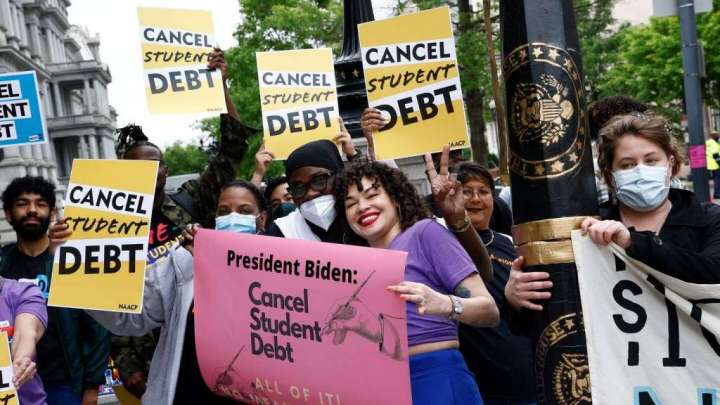The reaction to the news that the White House is on the verge of forgiving $10,000 worth of federal debt for the vast majority of student loan borrowers is a reminder that the issue is a problem from hell. Many activists, demanding $50,000 in debt forgiveness or more, with no earnings limit, are unlikely to be fully satisfied. Others are indignant over what they see as an egregious misuse of government funds, a giveaway to people who don’t need help.
Student loan forgiveness is not enough. We need major reform.

They are both wrong. It’s an extraordinary gesture, and one that will almost certainly benefit Democrats in the short run. But forgiveness is not good enough, and the amount in question is not the issue. It’s a bigger problem: If the cancellation is not accompanied by larger, systemic reforms, we will almost certainly arrive at this pass again.
Make no mistake: The nation’s $1.7 trillion in student loan debt is an economic albatross.
Seven out of 10 recent college graduates borrowed money to help get them through college, up from half 30 years ago. People who attend graduate school will acquire even more debt, sometimes into the six figures. They aren’t all high-flying corporate lawyers, either. Future veterinarians graduate owing, on average, more than $180,000.
Follow Helaine Olen‘s opinions
FollowThe reason for this mountain of growing debt is not mysterious. Both federal and state support for students seeking higher education has fallen over the past several decades, even as the cost of attendance soared. (It fell again during the pandemic.) People were repeatedly told their best chance of getting ahead was to seek an advanced education, whether through academia or by upgrading or retraining in vocational skills. The result: teenagers not even old enough to buy an alcoholic beverage legally are now signing up for life-altering amounts of debt.
Decades of policy and regulatory failures compounded the crisis. Dodgy for-profit colleges saw desperate Americans as easy financial pickings — leaving their former students in debt with little in the way of enhanced career prospects. Income-based repayment plans proved both difficult to navigate and useless for actually eliminating debt. After 12 years, many student loan debtors using them will owe more than they originally borrowed. At the same time, we made student debt more onerous with legislation that made it all but impossible to excise it in bankruptcy court — thanks toPresident Biden, among others.
counterpointIf Biden wipes out college debt, why work hard and play by the rules?
All this is why, contra the claims of Washington wonks, polls repeatedly find at least some forgiveness enjoys majority support, especially when combined with income caps. Research released Friday by Data for Progress and the Student Borrower Protection Center found that people who attended college are less likely to support forgiveness than those who did not. This doesn’t surprise me. Many of the borrowers and their families I’ve spoken to over the years have been first-generation college students, and couldn’t afford to attend college unless they borrowed money.
And $10,000 in debt cancellation can make a substantive and life-changing difference. A third of all borrowers owe less than $10,000, and half owe less than $20,000. Many borrowers who default on their loans owe even less, under $10,000 — and in some cases, these are the people who never received a degree, leaving them worse off than if they had never gone to college at all.
All this also explains why debt forgiveness is a likely political winner for Democrats in 2022. But forgiveness simply kicks the bucket down the road. It does not solve the larger issues: why college got so expensive, and how we as a nation should help people pay the tab.
This is where we need Congress to step up. Lowering the interest rate on student loans, which Sen. Elizabeth Warren (D-Mass.) has proposed in the past, would cut into the number of people who make their monthly payments, only to find themselves falling further and further behind. Permitting financially overwhelmed borrowers to seek relief in bankruptcy court short of “extreme hardship” would help too. (There is currently bipartisan legislation in the Senate that would permit this after 10 years.)
It is Congress that would need to vote to increase the funds lower-income students can receive if eligible for Pell Grants. And, of course, it is Congress that would need to authorize the funds to, as Biden promised in his campaign, make community college free.
Instead of carping — or, like Republicans, proposing legislation to stop forgiveness in its tracks — Congress might want to get on it. Our economy would almost certainly benefit. Student debt is the responsibility of the individual borrower, but it impoverishes us all. It impacts career choices, decisions on the quality of school attended, whether to start a small business, even the decision of when to have a child and, as a result, people’s contributions to the overall economy. But a one-time debt jubilee is not enough. We need to put this problem behind us once and for all.






